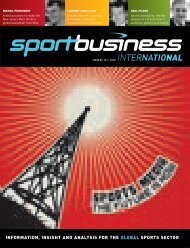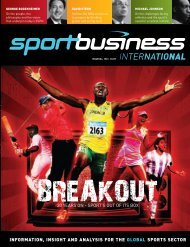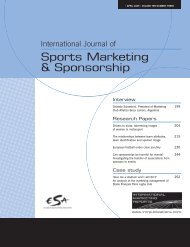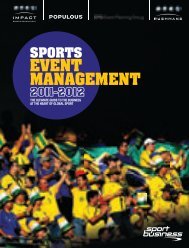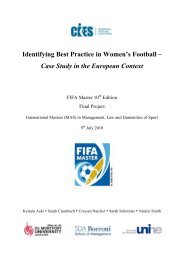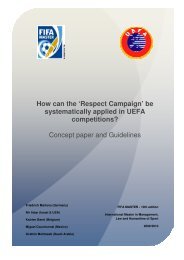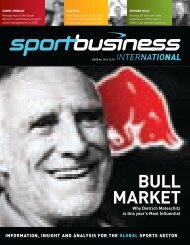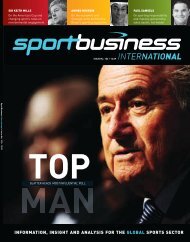4 - FIFA/CIES International University Network
4 - FIFA/CIES International University Network
4 - FIFA/CIES International University Network
You also want an ePaper? Increase the reach of your titles
YUMPU automatically turns print PDFs into web optimized ePapers that Google loves.
EYE ON THE<br />
INDUSTRY<br />
GREAT HAUL OF CHINA<br />
For years the West has coveted the Chinese market, often using sponsorship<br />
for entry. Now traffic is flowing in the opposite direction, writes Barry Wilner.<br />
SPONSORSHIP OF sport in China by major<br />
global brands peaked before and during the<br />
Beijing Olympic Games. But now a new trend<br />
is emerging as Chinese companies become<br />
sponsors on the international scene as they look<br />
to build share in global markets.<br />
Li Ning, a sportswear company founded by<br />
the Olympic champion gymnast and six-medal<br />
winner at the 1984 games in Los Angeles,<br />
reached an agreement with Shaquille O’Neal in<br />
2006 and since then has sponsored Sweden’s<br />
Olympic teams, plus Spain and Argentina’s<br />
basketball teams.<br />
Additionally Anta sponsors tennis star<br />
Jelena Jankovic, Xtep partners English Premier<br />
League football club Birmingham City and most<br />
recently, Peak, which eventually hopes to be the<br />
Nike of its homeland, signed a five-year deal<br />
with the women’s tennis tour that is worth more<br />
than $1 million annually (see pp. 44-45).<br />
The idea is to use sponsorship of foreign<br />
athletes to boost brand image within China’s<br />
sporting goods market, which is worth more<br />
than $6 billion and is projected to grow 14 per<br />
cent a year.<br />
“More than 30 Chinese firms partnered with<br />
the Beijing Olympic Games, including PC-maker<br />
Lenovo as a global Olympic sponsor. Chinese<br />
electronic gadget-producer Aigo sponsored the<br />
McLaren-Mercedes Formula One team and<br />
Manchester United,” says Zak Brown, CEO of the<br />
Just Marketing <strong>International</strong> agency.<br />
“This trend will continue with more Chinese<br />
companies getting involved in international<br />
sports sponsorships, with an increased emphasis<br />
on activation beyond just having signs in the<br />
field...Motorsports would be among the naturals.<br />
“The massive global audience and gateway to<br />
Li Ning at the NBA signing ceremony in 2005 - Getty Images Sport<br />
eager buyers of automotive, consumer and tech<br />
products and goods should drive expansion of<br />
investment in motorsports.”<br />
But basketball remains the top target of these<br />
Chinese sponsors.<br />
Peak is the official sponsor of the NBA<br />
in China and is most competitive in the<br />
marketplace with its basketball shoes. It opened<br />
more than 1,000 new stores in the past year,<br />
with total revenues doubling to $456 million,<br />
and has deals with a dozen NBA players,<br />
including all-stars Jason Kidd and Ron Artest.<br />
“We just want to extend our brand name<br />
from basketball to tennis,” says Peak CEO Jim<br />
Xu. “China is our top market. Signing deals with<br />
international sports competitions is to attain<br />
our goal of becoming more global and more<br />
professional. But, of course, the primary impact<br />
will be on China and then the global market.”<br />
Still, attracting big names across a wide<br />
spectrum of sports eventually would be a<br />
wiser approach. “In general terms, the major<br />
international sports that have a big following<br />
in China are NBA, soccer [football] and golf<br />
- the latter among the sought-after wealthy<br />
professional Chinese demographic,” adds Brown.<br />
“As such, they attract foreign sponsorship<br />
and brands seeking penetration in the Chinese<br />
consumer market. English Premiership clubs<br />
such as Manchester United have established<br />
permanent relationships in the country through<br />
demonstration tours, academies and exchange<br />
programmes. This is a trend that will continue.”<br />
Next to look for might be more widespread<br />
involvement by Chinese food, beverage and<br />
transportation services. Eventually, it is also<br />
predcited, investment firms, banks and<br />
automakers will become big players too.<br />
BRANDS + MARKETING<br />
BACK THE BID?<br />
Adam Paker asks whether<br />
sponsoring bids to host major<br />
sports events is worth it.<br />
In December <strong>FIFA</strong> will, for the first time,<br />
select the host countries for not one but<br />
two World Cups.<br />
All of the bids have sponsors but is it<br />
worth backing an event bid considering<br />
the risks associated with it? The question<br />
was asked in England in May, when<br />
the country’s 2018 backers braced<br />
themselves for the fallout from then<br />
chairman Lord Triesman’s accusations of<br />
bribery against rival bids.<br />
Bid sponsors gain limited rights and<br />
a short time in which to activate them.<br />
Worst of all, sponsors of unsuccessful bids<br />
face reflected embarrassment – and live<br />
in fear they will be tarred with the same<br />
brush as the failed (and in the public’s eye,<br />
incompetent) bidding committee.<br />
Moreover, even sponsors of<br />
successful bids cannot be complacent,<br />
since the period of public jubilation<br />
is finite. Some brands (EDF Energy<br />
in relation to London 2012) choose to<br />
extend their relationship by sponsoring<br />
first the bid, then the event itself. But<br />
this inevitably entails much higher costs<br />
than may initially have been envisaged.<br />
Ultimately, backing a bid is a gamble<br />
and the smartest sponsors will treat it<br />
as such - in the first instance by paying<br />
an amount that reflects option pricing<br />
and a dispassionate assessment of the<br />
bid’s chances.<br />
Then, sponsors must activate their<br />
rights hard in the run-up to the decision,<br />
develop a game plan to capitalise on<br />
success and be prepared to turn the<br />
page and move on quietly to other<br />
marketing campaigns if the bid flops.<br />
The attractions are obvious. There’s a<br />
record 11 countries bidding or co-bidding<br />
for the 2018/2022 World Cups, and<br />
with no clear front-runner for either<br />
tournament, levels of interest should add<br />
up to a bonanza for the bid sponsors.<br />
A brand has the chance to appear<br />
both patriotic and public-spirited, while<br />
tapping into the public elation that comes<br />
with success - who can forget the scenes<br />
in London’s Trafalgar Square in 2005<br />
when the city celebrated a successful<br />
campaign to host the Olympics?<br />
It’s also a gilt-edged opportunity<br />
for some ‘legitimised ambushing’.<br />
Morrisons is sponsoring England’s<br />
2018 bid, even though the food retailing<br />
sponsor of the English Football<br />
Association (which is meeting most of<br />
the bid costs) is arch-rival Tesco.



